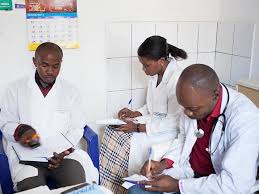The U.S. Census Bureau reports that the number of African-born immigrants in the United States has roughly doubled each decade since 1970, with the largest increase occurring from 2000 to 2008-2012. The influential PLOS Medicine journal also has reported that physician emigration from sub-Saharan Africa to the United States was increasing.
With 41 percent of African-born residents in the U.S. possessing a bachelor’s degree or higher, compared with 28 percent for the overall foreign-born U.S. population, and the number of sub-Saharan African physicians in the U.S. increasing by 38 percent between 2002 and 2011, Africa well may be a net exporter of brainpower to the United States. That’s in addition to being a net exporter of credit to the world, based on the African Development Bank’s tally of money leaving the continent each year for European and North American banks.
It may exist, but I have yet to see a dollar value for the brainpower loss to Africa and its equivalent gain for the United States.
The PLOS Medicine article, “Physician Emigration from Sub-Saharan Africa to the United States: Analysis of the 2011 AMA [American Medical Association] Physician Masterfile,” predicts that African physician flight will persist, with the United States remaining a leading destination for physicians emigrating from “the continent of greatest need,” if far-reaching policies were not implemented by both the U.S. and sub-Saharan Africa countries.
The AMA master file collects annual demographic, academic and professional data on all residents (physicians undergoing training in a medical specialty) and licensed physicians who practice in the United States. Its 2011 file shows 10,819 physicians who were born or trained in 28 sub-Saharan African countries. It’s a conservative number, since the file only lists physicians who qualify for a U.S. residency position. More physicians may have moved from sub-Saharan Africa to the U.S. and may be working in other jobs incommensurate with their medical degrees — “brain waste.”
Of the estimated 226 physicians in Liberia, the country hardest hit by the current Ebola outbreak, 77 percent showed up in the 2011 AMA file. Issuing an SOS to the international community in October, Liberian President Ellen Johnson Sirleaf said the current Ebola outbreak had killed more than 2,000 people in her country and had brought it to “a standstill.”
Sub-Saharan Africa has only 2 percent of the global physician workforce but a quarter of the global burden of disease. Since 1970, large-scale emigration and limited medical education have resulted in “negligible or negative growth in the density of physicians in many countries in the region,” the PLOS Medicine article said. Liberia, for example, had 7.76 physicians per 100,000 people in 1973, but by 2008 there were only 1.37 physicians per 100,000 people.
The U.S. Census Bureau says the number of African-born U.S. residents rose to about 1.6 million between 2008 and 2012 from about 80,000 in 1970, a jump to 4 percent of the entire U.S. foreign-born population from 1 percent in 1970. Most came from West Africa (36 percent), East Africa (29 percent), and Northern Africa (17 percent).
Four states have benefited the most from African-born immigrants: New York, with a population of 164,000 African immigrants; California (155,000); Texas (134,000); and Maryland (120,000). Metropolitan areas with the largest African-born populations were New York (212,000), Washington, D.C., (161,000), Atlanta (68,000), Los Angeles (68,000), Minneapolis-St. Paul (64,000), Dallas-Fort Worth (61,000) and Boston (60,000).
Nigeria, Ethiopia, Egypt, and Ghana together account for 41 percent of the 1.6 million. Three of these four countries — Nigeria, Ethiopia and Ghana — have been ranked among the world’s ten fastest growing economies. Nigeria this year overtook South Africa as the continent’s biggest economy. Among the 10 metro areas with the largest African-born populations, Nigerians are the most populous group, constituting 20 percent or more of the African-born in the Atlanta, Chicago, Dallas-Fort Worth and Houston metros. Ethiopians are a high proportion and the largest group in the Washington D.C. metro; Cape Verdeans in Boston; Somalis in Minneapolis-St. Paul; Egyptians in Los Angeles; and Liberians in Philadelphia.
Perhaps these émigrés have not heard — perhaps they don’t care — that Africa is home to many of the world’s fastest growing economies? Perhaps the prosperity accruing to these fast-growing economies is too contained to stem ill-afforded brainpower exports.
Perhaps Ebola will force African governments to build strong health systems at home instead of buttressing the health systems of wealthy nations with money and brains.
Hopefully, it will trigger more interest in and support for the African Medical Association (and its local chapters), established in 2004 by physicians of Africa as their collective voice to advocate for better health care for the people of the continent, organize the continent’s health issues, and participate actively in world health issues.













